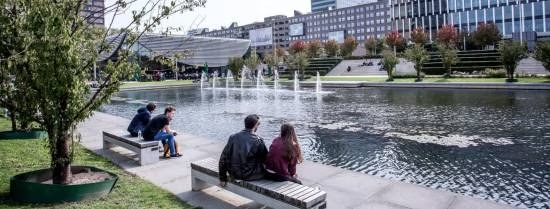Jonathan Mijs will be presented with a KNAW Early Career Award on 14 February. The prize of 15,000 euros is intended for Dutch scientists who conduct innovative research and who are at the beginning of their career. Since 2020, Mijs has been working at the department of public administration and sociology at the EUR and he also teaches at Boston University. As a Veni fellow, he researches ideas about inequality in both the Netherlands and the United States: 'few people are aware of inequality and it is often looked away from'.
Where does your interest in inequality come from?
"I grew up in Amsterdam and in my neighbourhood there were mostly people with a Surinamese, Moroccan or Turkish background. I felt very comfortable in that neighbourhood. My parents chose a primary school in a completely different neighbourhood. It was very white and high class. Yoep van 't Hek's son (a famous Dutch comedian) was at my school, just to give you an idea. Classmates lived in a big house on the canals, while children from my neighbourhood lived in a flat with eight of them.
So I was aware of the contrasts very early on. My parents chose a school where they thought I would get the best education. That was a choice between a 'black' or a 'white' school, but in practice that meant choosing a school where almost all the parents of the children were highly educated or less so. It is actually very unfortunate that you are faced with such a choice and that there is no nice middle ground. Actually, all choices should be more like a middle ground. You can include something like that in the layout of the neighbourhood, but in my view it's still not taken seriously enough."
Why is it important to investigate conceptions of inequality?
"Social inequality has far-reaching consequences and you have to think of solutions for that. But what makes it worse is that so few people are aware of these inequalities and a lot of people look away. People at the bottom of society are also often blamed. They are said not to have worked hard enough and not to have taken advantage of their opportunities. Conversely, success is often seen as something they have earned themselves. I don't want to let my own convictions speak for themselves, but I want to do some serious research into how people talk about inequality and under what circumstances they are prepared to revise their views.
As scientists, we are quite late in exploring this topic. In popular culture, there is a lot of attention for social inequality, think for example of the documentary Klassen, which is about inequality of opportunity in education. The Netflix series Squidgame was a huge hit and paints a very harrowing picture of where opportunity inequality can lead if society looks away."
What are your findings?
"There are strong indications that people, both rich and poor, live very much in their own world. I have already mapped this out in the United States, but I would also like to investigate this for the Netherlands. If people hardly see each other at school or in the workplace, the chance that they are dating outside their bubble is small. And how aware are you of income inequality if you mainly live in your own world? Research shows that as bubbles become stronger, people are also less aware of inequality. An unequal society is not nice, but a society where this is not recognised is even worse."
In your research, you compare the US and the Netherlands. What are you looking at?
"Using survey experiments, I study how people react to facts about inequality. For example, I tell people how often ethnic discrimination occurs on the shop floor. You then see that the awareness of social inequality increases, but in the Netherlands, the reaction was much stronger than in the US. This indicates that in the Netherlands we are much less aware of inequality and its causes. That African-Americans are discriminated against is well known. Dutch research shows that candidates with a name that sounds Islamic have just as much less chance of finding a job. We see ourselves as a progressive, egalitarian and tolerant country, but that is actually quite disappointing."
How can you raise that awareness?
"People react to new information so you could make attempts to create more awareness, think of a good information campaign. But the most important thing is that people do not live in separate worlds, but meet each other every day. Schools are very important for this, so that children come into contact with each other at a young age. To prevent bubble formation, it is important to invest more in good public facilities, such as parks and libraries. The tricky thing about the metaphor of a bubble is that it implies that you can burst it. Unfortunately, such patterns and divisions are very persistent."
You will soon receive the KNAW Early Career Award, what does this recognition do to you?
"I feel honoured and it feels like a great encouragement. It recognises inequality as a theme, but also that it is important to find good ways of researching this. I would like to use the money to be able to share the research with a wider audience. NGOs, such as Oxfam and Amnesty, have much more experience with awareness-raising campaigns than I do as a scientist. That way you can build a bridge between research and practice. I think that's important because as a scientist you shouldn't have the arrogance that you're there to explain something to people."
- Researcher
- More information
The KNAW interviewed Mijs about the Early Career Award. Read the interview (in Dutch)
Dutch newspaper Het Parool had an interview in the newspaper of 14 February. You can read it here (in Dutch)
- Related content

